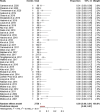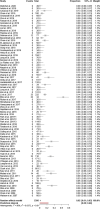Validity of a two-antibody testing algorithm for mismatch repair deficiency testing in cancer; a systematic literature review and meta-analysis
- PMID: 36104536
- PMCID: PMC9708570
- DOI: 10.1038/s41379-022-01149-w
Validity of a two-antibody testing algorithm for mismatch repair deficiency testing in cancer; a systematic literature review and meta-analysis
Abstract
Reflex mismatch repair immunohistochemistry (MMR IHC) testing for MLH1, PMS2, MSH2 and MSH6 is used to screen for Lynch syndrome. Recently MMR-deficiency (MMRd) has been approved as a pan-cancer predictive biomarker for checkpoint inhibitor therapy, leading to a vast increase in the use of MMR IHC in clinical practice. We explored whether immunohistochemical staining with PMS2 and MSH6 can be used as a reliable substitute. This two-antibody testing algorithm has the benefit of saving tissue, cutting costs and saving time. PubMed, Embase and Cochrane library were systematically searched for articles reporting on MMR IHC. The weighed percentage of cases with isolated MLH1 or MSH2 loss or combined MLH1/MSH2 loss alone was analyzed using a random effects model meta-analysis in R. The search yielded 1704 unique citations, of which 131 studies were included, describing 9014 patients. A weighed percentage of 1.1% (95% CI 0.53-18.87, I = 87%) of cases with isolated MLH1 or MSH2 loss or combined MLH1/MSH2 loss alone was observed. In the six articles with the main aim of investigating the two-antibody testing algorithm all MMRd cases were detected with the two-antibody testing algorithm, there were no cases with isolated MLH1 or MSH2 loss or combined MLH1/MSH2 loss alone. This high detection rate of MMRd of the two-antibody testing algorithm supports its use in clinical practice by specialized pathologists. Staining of all four antibodies should remain the standard in cases with equivocal results of the two-antibody testing algorithm. Finally, educational sessions in which staining pattern pitfalls are discussed will continue to be important.
© 2022. The Author(s).
Conflict of interest statement
E.J.C. is a National Institute of Health fellow (NIHR300650) and her work is supported by the National Institute of Health Manchester (IS-BRC-1215-20007).
Figures




References
-
- Eikenboom, E. L., van der Werf-‘t Lam, A. S., Rodriguez-Girondo, M., Van Asperen, C. J., Dinjens, W. N. M., Hofstra, R. M. W. et al. Universal Immunohistochemistry for Lynch Syndrome: A Systematic Review and Meta-analysis of 58,580 Colorectal Carcinomas. Clin Gastroenterol Hepatol10.1016/j.cgh.2021.04.021 (2021). - PubMed
-
- Boland CR, Thibodeau SN, Hamilton SR, Sidransky D, Eshleman JR, Burt RW, et al. A National Cancer Institute Workshop on Microsatellite Instability for cancer detection and familial predisposition: development of international criteria for the determination of microsatellite instability in colorectal cancer. Cancer Res. 1998;58:5248–5257. - PubMed
Publication types
MeSH terms
Substances
Supplementary concepts
Grants and funding
LinkOut - more resources
Full Text Sources
Medical
Miscellaneous

